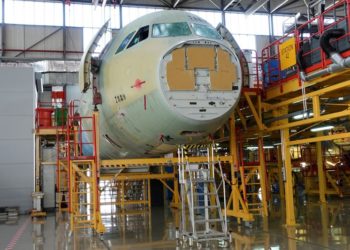(Bloomberg) — It may seem like a worsening economy would be a boon for ultra-budget carriers, but in reality it’s the opposite. People who can’t afford to fly don’t really trade down, they just stop flying — leaving mostly those traveling for business, internationally or on loyalty points, up for grabs.
Most Read from Bloomberg
That comes as the industry has undergone a big shift: Lower-cost airlines such as Spirit and Frontier have sought to go more upscale, and full-service carriers like Delta Air Lines Inc. (DAL) and United Airlines Holdings Inc. (UAL) have broadened their range to capture budget-minded travelers. JetBlue Airways (JBLU) Corp. has sought to offer lower fares but with a more upscale ambiance such as vegan leather seats and self-serve snacks.
Demand for domestic leisure travel — the bread and butter for low-cost carriers — is rapidly evaporating as President Donald Trump’s trade war rattles consumer confidence. It’s thrown airlines’ hopes for a banner year and higher ticket prices out the window, and with it, an expected tailwind for discount carriers retooling their offerings.
Most US airlines have withdrawn their full-year earnings forecasts.
Even as more passengers look for bargains, it’s discount carriers that stand to be hit hardest from the downturn ripping through the aviation industry.
“I am honestly just done with them overall for our major family trips,” said Jim Wahlen, a 42-year-old who works in commercial property maintenance. “I have flown Spirit, Frontier, and Allegiant in the past and it is always just stressful on what they are going to charge you for and when.”
Wahlen said he recently booked a trip for his family of four from Chicago to Punta Cana in the Dominican Republic on Frontier. He bought the tickets thinking they would cost far less than flying on a legacy carrier like Delta. But after the fees added up, the difference became much smaller than expected — bringing him to regret flying on a budget carrier.
Frugal-flyer airlines set out to democratize air travel through a lowest common denominator approach — and for years earned tidy profits doing so. But more recently they’ve struggled. Spirit went bankrupt late last year. Frontier said on May 1 that it expects to post another loss this quarter. Smaller operators like Allegiant Air and Sun Country Airlines making direct flights primarily to leisure destinations saw 2024 profit margins decline.
Part of that stems from stubbornly higher costs after the pandemic that upended their ability to operate as bargain-bin businesses. It also reflects more competition from legacy carriers and a fatigue factor among the flying public: Spirit and Frontier rank among the worst for on-time arrivals and for the percentage of canceled flights.
Those two carriers are dealing with their existential crisis by ditching a longstanding rock-bottom pricing formula. Instead, they’ve tiptoed toward fuller service cabins with more fare options, assigned seats and even a free checked bag. But that also adds costs.
“As consumers changed their preferences, we evolved with the times,” Barry Biffle, chief executive officer of Frontier Group Holdings Inc., said in an interview. “They want more, so that’s why we’re introducing a first-class product later this year.”
Spirit, which emerged in March as Spirit Aviation Holdings Inc. following its Chapter 11 filing, declined to comment. Its relisted shares fell 32% in their debut April 29.
Big carriers — which are better insulated from domestic travel because of their international operations and corporate clients — have doubled down on their own no-frills offerings since the pandemic. But those basic economy seats still include some benefits like decent legroom, free beverages and popular loyalty programs.
“The low-cost carrier model is about ‘We’re going to offer you a low price and we’re going to, pardon my language, screw you everywhere else’,” United CEO Scott Kirby said April 24 at a conference in Washington. “And customers hate it.”
At its heyday in the 2010s, Spirit rose to prominence with cheap ticket prices, shock marketing tactics and optional add-ons — including its infamous carry-on bag fee, an industry first. The carrier made it all work by running an extremely lean operation. It saved money by cramming passengers into one-size-fits-all planes with non-reclining seats and charging extra for anything and everything.
A bottle of water? Assigned seat? Printed boarding pass? All subject to additional fees.
Spirit even pulled the plug on its toll-free customer service number to save money under thrifty former CEO Ben Baldanza. Executives at its headquarters near Fort Lauderdale, Florida, were responsible for emptying trash cans and vacuuming their own offices.
But above all, growth was paramount. The more planes being flown, the lower the cost to fly each seat a mile. That formula allowed the discounters to profit even as they cut fares relentlessly.
Spirit’s adjusted operating margin was more than double that of larger rivals like American Airlines Group Inc. and United in some years. The spunky carrier’s profit peaked in 2019, just before the pandemic wreaked havoc on the airline industry. It’s lost money each year since then.
“The original ultra-low-cost model is gone for good in the US,” said Frontier Chairman Bill Franke in a separate interview. “It will be difficult to move back to a model that is less consumer friendly.”
That strategy was pioneered by Spirit two decades ago under the guidance of Franke after his Indigo Partners LLC, took controlling ownership. He later sold his stake and used the same playbook when he bought Frontier in 2013. Other discount airlines sought to emulate the initial success of Spirit and Frontier, but on a more limited scale.
Franke blames the demise on a constellation of factors, including higher costs after the pandemic for everything from labor contracts to landing fees at airports. And then there’s the incursion by legacy carriers with their own lower-cost seating options.
“The rise of basic economy and the use of that as a weapon has changed the landscape,” said Conor Cunningham, a Melius Research analyst.
Spirit was ready to leave its discounter roots behind by accepting a takeover offer from JetBlue, but the merger was blocked on antitrust grounds last year by a federal judge.
That closed off the type of exit ramp used by People Express Airlines, the original low-cost carrier from the 1980s. It was bought out by the former Texas Air and then merged into Continental Airlines, which is now part of United.
—With assistance from Will Kubzansky.
Most Read from Bloomberg Businessweek
©2025 Bloomberg L.P.
The post It’s the end of cheap flying as Americans tire of budget airlines appeared first on Bloomberg.




